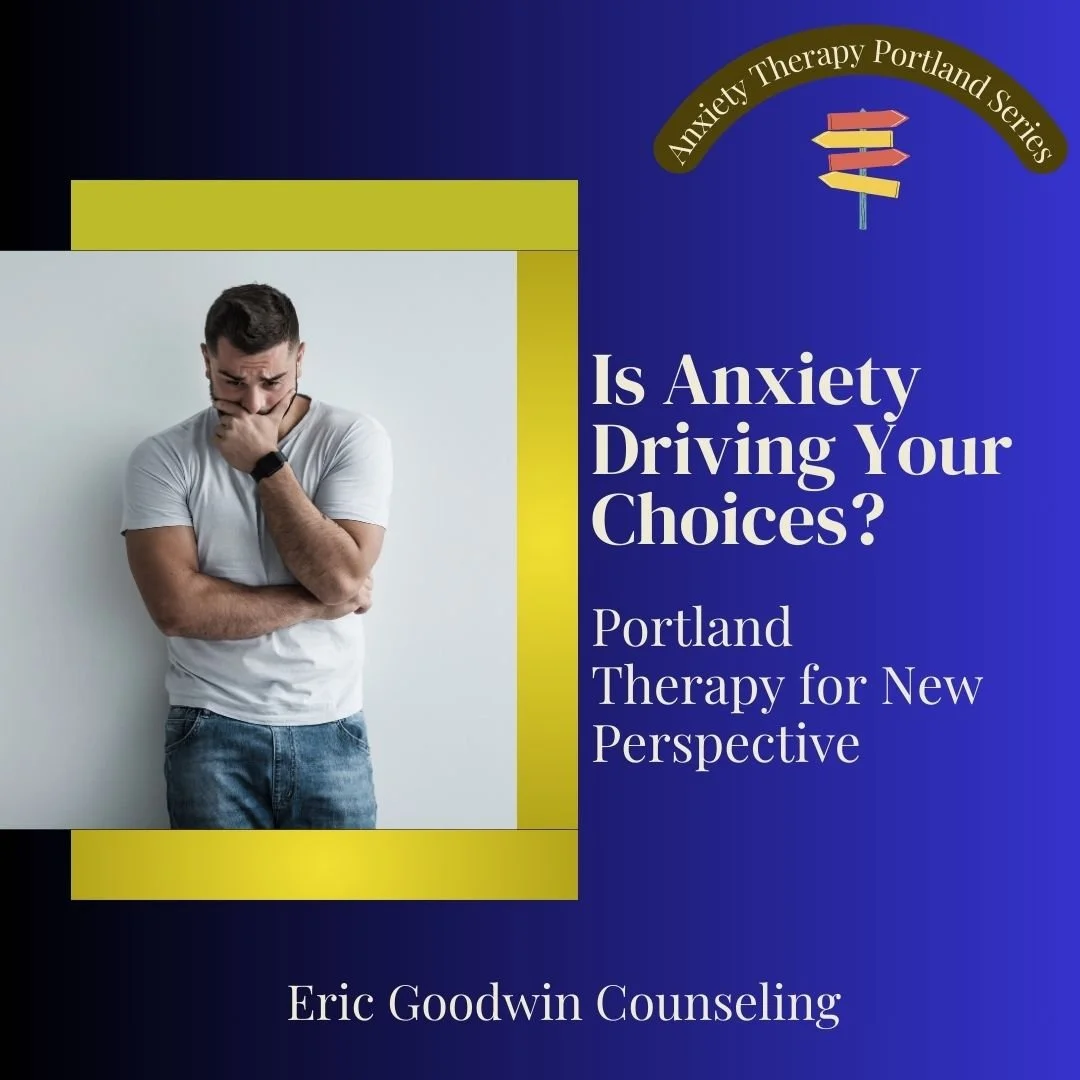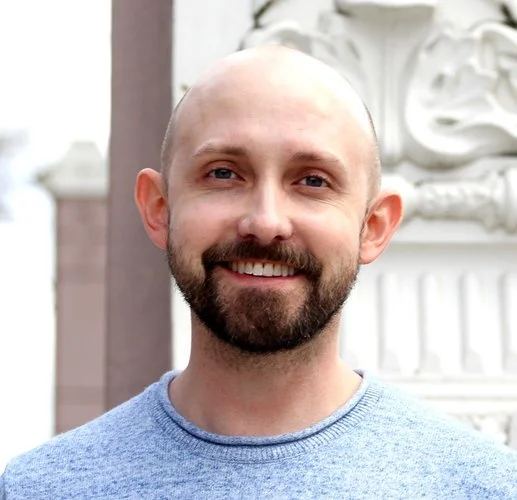Is Anxiety Driving Your Choices? Portland Therapy for New Perspective
Anxiety therapy in Portland can offer more than relief, it can help you make choices from clarity, not fear.
Have you found yourself agonizing over a text message, replaying conversations when you’d rather be sleeping before a big day, or felt stuck at the crossroads of a big life decision? If so, you’re not alone. For many thoughtful, considerate people (especially those who identify as LGBTQ+) anxiety can work overtime to disorient a person’s internal compass. Sometimes shaping your choices in ways that may be so familiar or subtle that they are not easy to detect, but can sure create a big impact.
You may find yourself wondering: Is this what I really want? Or is this just what feels safest? What if that question were the trailhead to understanding your hopes, values, and needs with more empowerment and clarity?
When Anxiety Becomes the Decision-Maker
Anxiety is rarely just about “worry.” Often, it’s an inner pressure to get things right, to avoid mistakes, conflict, disappointment, or regret. For some, it shows up as over-researching, overthinking, and seeking reassurance. For others, it’s avoidance, putting off the decision entirely, hoping the discomfort will fade if we wait long enough.
But that discomfort doesn’t fade. It festers.
You might start to notice yourself defaulting to other people’s preferences or feeling paralyzed by the fear of making the wrong choice. You question your own gut instincts. You shrink your world without meaning to, saying no to things you long for, or saying yes to things that don’t align.
And each time that happens, something in you grows smaller. Quieter. More uncertain.
It Makes Sense If This Is Your Pattern
Many of us, especially those with lived experiences of marginalization or trauma, learned to scan for threat early and often. Anxiety becomes a survival tool. It keeps you alert to danger, attuned to other people’s moods, and always ready to protect yourself.
In fact, that anxious part of you has probably done a lot of heavy lifting over the years. It may have helped you avoid pain, fit in, stay safe, or maintain peace. It might even feel like a core part of who you are.
But anxiety, while protective, often overreaches. It doesn’t just warn you of fire, it tells you to avoid the whole forest.
What helped you survive before might be keeping you stuck now.
How Therapy Helps You Notice the Pattern and Choose Differently
In therapy, we create opportunities to slow down and stay curious about what’s happening beneath the surface. Not from a place of self-criticism, but from compassion. Together, we gently notice when your choices are being driven by fear or by internalized rules about who you’re supposed to be.
What happens in your body when you’re faced with a decision? Is there a tightening, a pulling away, a sudden pressure to get it right? We start to notice whose voice echoes when doubt floods in (maybe it’s a parent, a past partner, or the culture that taught you certain desires were too much). And then, gently, we ask: What are you afraid might happen if you choose the thing you actually want? These aren’t interrogations. They’re invitations; ways to begin loosening the grip of anxiety so you can hear yourself more clearly.
You don’t need to have the answers before you begin. The questions themselves can help loosen the grip.
Over time, something shifts. You start to feel more room between you and your anxiety. You notice the moment before the spiral, and you pause. You begin to distinguish between the voice of your fear and the voice of your values. And even when the fear is still there, you find you can begin moving forward with care, with courage, and with increasing clarity.
Make Choices with Confidence Instead of Fear
Part of healing is recognizing that no perfect choice exists. Every decision brings some uncertainty. But when anxiety drives the decision-making process, the goal becomes avoidance of discomfort, not alignment with your needs or desires.
Therapy helps you turn that around. Rather than asking, What if I mess this up? you begin to ask, What feels most true?
You learn to consider the multiple perspectives and experiences you hold, including the anxious parts, without letting them steer the ship. You grow a stronger connection to your own values and intuition. You find what matters to you, not just what’s safest, easiest, or most acceptable.
These aren’t always big, earth-shattering changes. Often, it’s subtle. Saying yes to something you’d normally avoid. Saying no to something that drains you. Trusting your gut, even when anxiety is sharing its long list of doubts.
A New Perspective Based on Self-Trust
You don’t have to become “fearless” to live well. But you can build a life where fear isn’t making every decision.
Therapy gives you a place to notice your own patterns with kindness. It helps you learn to hold space for discomfort, the kind that comes with growth, without assuming it means something’s wrong. It invites you to trust your own voice a little more each day.
And if you’re LGBTQ+, this work carries even more depth. So many of us have been taught, directly or indirectly, to distrust our instincts, to question our feelings, or to believe we’re too much. Therapy can be where that unlearning begins.
Let’s Begin Together
If anxiety has been shaping your decisions, whether in loud or quiet ways, you’re not alone. And you don’t have to untangle this by yourself.
I’m Eric Goodwin, a Queer therapist offer anxiety counseling in Portland that centers compassion, curiosity, and the richness of your lived experience. Whether you’re trying to find your footing again or make a single decision with more clarity, therapy can be a place to land and explore what’s possible. You’re welcome to bring any questions or reflections from this blog to your free 15-minute consultation, where you get the opportunity to get a sense of what it would be like begin therapy with me.
Author Bio
Eric Goodwin, LPC, offers LGBTQ+ affirming anxiety therapy in Portland to help clients move from inner criticism to clarity and self-trust.
Eric Goodwin, LPC, is a Licensed Professional Counselor in Portland, Oregon. Eric specializes in anxiety therapy in Portland and provides LGBTQ+ affirming care for individuals who are ready to move beyond self-doubt, shame, and chronic inner criticism. Eric helps clients build a more compassionate relationship with themselves using mindfulness, self-trust, and a deep understanding of Queer identity. You’re welcome to bring any questions or reflections from this blog to your free 15-minute consultation, which is there for you to feel things out. You can learn more about working with him here or schedule a free consultation, by calling (971) 533-5590 or clicking here, to see if working together feels like a good fit.
FAQs About Starting Anxiety Therapy in Portland:
1. How can anxiety affect decision-making?
Anxiety can make choices feel overwhelming, urgent, or impossible. You might overthink every option, fear making the “wrong” move, or avoid decisions altogether. Therapy can help slow this process down so you can make decisions with more clarity and self-trust.
2. Is it normal to second-guess everything?
Yes. For many people, especially those living with anxiety, second-guessing is part of the pattern. It doesn’t mean you’re broken, it often means you’ve had to be cautious or careful in the past. Therapy helps you shift from self-doubt to self-understanding.
3. Do I need a diagnosis to start therapy for anxiety?
Not at all. You don’t need to meet specific criteria or have a formal diagnosis. If anxiety (or any inner struggle) is interfering with your ability to feel grounded, therapy can offer help.
4. What if I don’t know what I want?
This is a more common starting point than you might think. If you’ve been disconnected from your needs or intuition for a while, naming your wants can feel foggy. Therapy is a space where you can reconnect with what matters to you.

